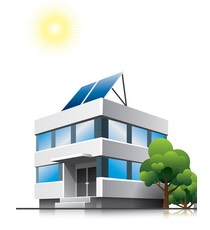4 key things to look for when choosing a commercial solar provider

What every small/medium business owner should know
I've fielded a lot of inquiries lately from small business owners asking about how much value solar energy can bring to their business. These conversations are a lot more straightforward than ones I have with homeowners, as small businesses tend to use their electricity between 9am and 5pm. This means that if they invest in solar power, they'll see a much higher rate of return than homeowners who tend to use their electricity when the sun goes down.
But I digress. The fact that I keep fielding similar questions from SME's in a variety of industries tells me that it's time to consolidate all of my answers on commercial solar in one place – right here! Alternatively, for more in depth information, read my commercial solar guide.
So, without further ado… the four key things to look for when selecting a commercial solar provider:
1) Understand your electricity charges
Many commercial enterprises have ‘unbundled’ tariffs where they are charged separately for their energy consumption and peak demand. Solar power in these cases can still be good, but prepare for a longer payback period.
Key point: Make sure your solar company performs a detailed energy profile assessment, because solar power doesn’t always guarantee a reduction in peak demand.
2) Communicate your electricity consumption patterns
Solar power produces the most rapid payback when electricity generation is consumed on-site when the sun is shining. Electricity exported to the mains grid is less beneficial in a financial sense as a result of feed in tariff incentives being lower than mains-supply electricity costs. This means that businesses that consume most of their electricity during the night aren't great candidates for installing solar panels. It's also critical that your system is sized correctly..
Key point: Ensure your solar company carries out an hourly energy balance to ensure your electricity production won’t be wasted as exports to the grid.
3) Choose a firm with commercial solar experience
Installing a commercial solar system is a more complex undertaking than a residential solar project. Your solar company needs to execute a detailed structural assessment of your roof area, negotiate the system's connection to the mains grid, arrange any finance if this is required and custom-design a high performance system – this is not a cookie-cutter, one-size-fits-all exercise.
Key point: Make sure that your solar company has a solid track record with commercial solar power to minimize the risk of unnecessary delays between design and delivery.
4) Select trusted PV equipment and suppliers
A good quality solar power system should last more than 25 years. However, in the unfortunate event that something fails, you need to know you are covered. It's wise to choose components supplied by larger established equipment manufacturers with more than 5 years’ experience in the industry. It's also very important to ensure that the warranty is supported locally as you won't want to be having to ship components overseas.
Key point: Make sure that your solar company and equipment manufacturers are well-established, so that help will be available if you need it.
It’s not just financial benefits that installing solar panels can bring your business – being able to promote to your customers that your company sources its electricity from renewable energy means you’ll be seen as a community leader as Australia (and the rest of the world) seeks to reduce its reliance on fossil fuels.
More than 1.7 million Australian households have already made a similar investment in solar – which can provide you with trust, empathy and conversational access to customers who are trying to decide between your company and others in your field.
If I've managed to convince you to at least explore solar for your business, then you can get up to 3 quotes from commercial solar experts I trust (I'm a Chartered Electrical Engineer, so I'm fussy!) here:
